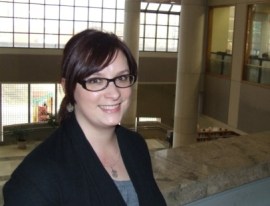Deans and administrators from each college suggested two faculty members who deserve special “kudos” during Faculty Appreciation Week.
Tahirah Akbar-Williams
 Tahirah Akbar-Williams teaches literacy — 21st-century style.
Tahirah Akbar-Williams teaches literacy — 21st-century style.
“We call it information literacy, making sure that students understand what information is, how to properly access it and use it, and ultimately to understand the difference between information and knowledge,” Akbar-Williams said. “Google Scholar may help you collect book chapters and journal articles, but then you need to understand what you are looking at, and that’s the start of knowledge.”
Akbar-Williams is an assistant professor of research services and an outreach librarian in the academic fields of child and family studies and women’s studies. She said information literacy isn’t just for students.
“We also work with staff, tenured and tenure-track faculty, instructors, lecturers, adjunct faculty, anyone who comes to us wanting to learn more about how to find materials, but also wanting to know how to find the right materials to help them.”
This training can take place in the library, Akbar-Williams said, but she also makes house calls.
“When an instructor requests it, I will come into a classroom for an hour or so and teach students how to properly search databases, how to locate library materials from dissertations to books to microfiche, whatever it is they need to do their research — not just for that class, but how to do proper library searches in general,” she said.
“Some students already know their way around the library, but some don’t, so you have to gauge the room,” she said. “I always start with the basics, because even though students think they know, they don’t really know. It’s great to be able to serve our students and faculty, help them become better patrons of their library, and improve their information literacy skills, which helps all of society.”
Melanie Feltner-Reichert
 Melanie Feltner-Reichert spends her days safeguarding the work of faculty, along with the photos, letters and other treasures of East Tennesseans.
Melanie Feltner-Reichert spends her days safeguarding the work of faculty, along with the photos, letters and other treasures of East Tennesseans.
Feltner-Reichert is an assistant professor in UT Libraries and the interim head of scholarly communication. She’s responsible for overseeing digital publishing efforts to support campus research and scholarship. These efforts include the libraries’ specialized digital collections, the Tennessee Research and Creative Exchange (Trace) and Newfound Press, the libraries’ digital press.
She also serves as the project leader for UT’s Digital Library Initiatives program, which is evaluating, revising and expanding the industry standards for digitizing still images, text, data, moving images and audio.
Lots of unique items come to the library for archival in the digital collections, Feltner-Reichert said. Examples include the William Cox Cochran photograph collection, photos from the Arrowmont School of Art in Gatlinburg and photos and journals from Albert “Dutch” Roth depicting life in the Greenbrier and Mt. LeConte areas of the Great Smokies National Park in its early years.
“We’re very fortunate to have these collections, and it’s especially gratifying knowing that these images and documents are now available to the world via the Internet,” she said.
The Trace program collects electronic copies of graduate student theses and dissertations, and has additional online tools for faculty. Newfound Press emphasizes peer-reviewed scholarly content that would not be of wide commercial appeal, due to the specialized audiences involved.
Her office does much more than just managing these repositories of information, Feltner-Reichert said.
“We also advocate for change in how we do scholarly communication, particularly with the advent of digital technologies, which presents new tools for research that would not have been conceived of even 10 years ago, including lots of opportunities for interdisciplinary work,” she said.
Bringing faculty from different academic disciplines together to do collaborative research is important to her, but Feltner-Reichert said it’s the little surprises that make the job even more fun.
“What I find motivating and rewarding about what we do, particularly in the scholarly communication department, is bringing hidden collections to light,” she said. “Sometimes we find these hidden gems, boxes of photos or documents gathering dust or sitting in someone’s basement that need to be shared with the world. To be part of that is just tremendously exciting and rewarding.”